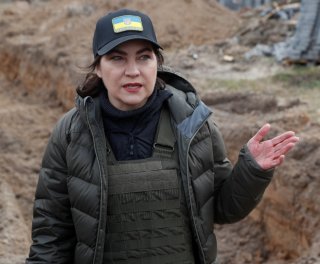Ukraine Carries Out an Unprecedented Blitz of War Crime Trials
Although Ukrainian officials say the prosecutions of Russian prisoners of war are being held in accordance with international law, they have raised red flags among legal experts.
A Ukrainian prosecutor announced on Wednesday that eight more war crimes cases have been filed against Russian soldiers.
The new slate of prosecutions follows three earlier war crimes indictments in May. Russian soldier Vadim Shishimarin, twenty-one, was convicted of shooting and killing an unarmed man on February 28. Alexander Bobikin and Alexander Ivanov were each given eleven-and-a-half years in prison for shelling civilian sites in a town located in the Kharkiv region.
The spate of prosecutions is part of a larger Ukrainian effort to hold accused Russian war criminals accountable. "Every day we see an increase [in investigations]," said Prosecutor General Iryna Venediktova, as per Reuters. "We are talking about people who didn't just come as military combatants ... but also came to rape, kill civilians, loot, humiliate and so on.” Venediktova added that some of the trials—including the case of Mikhail Romanov, who is accused of repeatedly raping a man’s wife and threatening to shoot the victim, according to Ukrainian authorities—will be conducted in absentia. Observers have warned that in absentia trials are legally problematic. “There’s a real problem of trying someone for a crime where they can’t really mount a defense,” Robert Goldman, a war crimes and human rights expert at American University’s Washington College of Law, told the Washington Post.
Ukrainian officials say the prosecutions of Russian prisoners of war (POWs) are being held in accordance with international law. But the investigations and subsequent prosecutions, unprecedented in their scale and scope, have raised red flags among legal experts. “Again you’ve got in a matter of days people who are tried and convicted for a very serious crime, which is a war crime. I have very real questions about the conduct of the trial and the adequacy of the defense,” said Goldman, who fleshed out his argument in a May 23 article written for the Conversation.
Although international law does not explicitly forbid war crimes trials of captured POWs during hostilities, the International Committee of the Red Cross has warned against this practice in one of its commentaries on the Geneva Convention. Goldman noted that the Third Geneva Convention requires POWs to be “tried only by a military court,” whereas it appears that at least some of Kyiv’s prosecutions of Russian soldiers are taking place in a civilian court. Military court officials, explained Goldman, are specifically trained in the technical and legal complexities surrounding crimes allegedly committed by servicemen in wartime conditions.
The Ukrainian trials could prompt reciprocal actions by Moscow, which is reportedly considering trying Mariupol’s captured Azovstal defenders in Russia or on the territory of the Russian-aligned separatist Donetsk People’s Republic (DPR). DPR head Denis Pushilin said in late May, without providing any additional details, that such trials are forthcoming.
Mark Episkopos is a national security reporter for the National Interest.
Image: Reuters.

